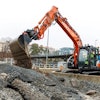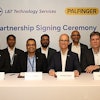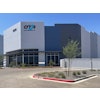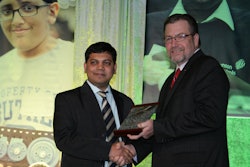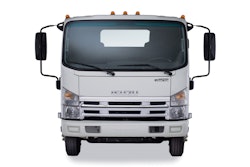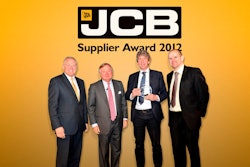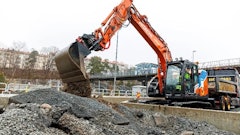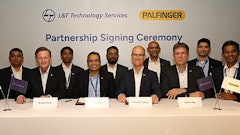The Eberspaecher Group concluded the 2011 financial year on a successful note. Group sales rose by 34%, taking them again for the first time above the level of 2008, the year before the crisis. As an annual average, the total number of employees grew over 12%. For 2012, company management expects sales to stabilize, with strong growth in the following years.
In 2011, Eberspaecher posted sales totaling 2,590.5 million euros, equivalent to an increase of 34% compared with the previous year or a rise of nearly 27% after deduction of transitory items. As an annual average, the company employed 6,331 employees and generated a net income of 76.3 million euros. “Eberspaecher profited from the new exhaust-emission standards and from the good business situation in the commercial vehicle market, but in the passenger car sector too, domestic and foreign demand was exceptionally high,” said Managing Partner Martin Peters at the annual press conference.
In the largest division, Exhaust Technology, sales of 2,141.6 million euros were posted in 2011, and the turnover of this division, adjusted for transitory items, reached 1,016.1 million euros. Eberspaecher was able to expand in North America in line with the growing market for the technologically sophisticated exhaust-gas aftertreatment of commercial vehicles and is planning to extend appropriate capacity. Moreover, the company has been preparing for the Euro 6 exhaust-emission standard for commercial vehicles coming into force in Europe from 2014. With this mind, a new production site has been built in Wilsdruff near Dresden, and in Sweden a controlling interest has been acquired in the company Swenox AB. Eberspaecher has thus been able to extend further its market-leading position in the exhaust-gas aftertreatment of future Euro 6 commercial vehicles. In addition, Eberspaecher has set up a new company in China to track the increasing need for higher-quality exhaust technology there too.
The Climate Control Systems division also grew significantly in 2011, posting sales of 448.8 million euros. Sales of vehicle heaters were considerably above expectations. Contributions were made both by business with vehicle manufacturers and commercial business for the aftermarket. The Germany sales operations were consolidated in the Mecklenburg-West Pomeranian town of Torgelow, thereby strengthening nationwide customer service.
As far as electrical vehicle heaters manufactured and distributed by Eberspaecher catem are concerned, the previous year’s sales level was substantially exceeded. In this, development work, especially involving innovative electronic solutions for battery-driven vehicles, also played a role.
Significant sales growth was also recorded at Eberspaecher Suetrak: international business in bus air-conditioning systems increased due, among other things, to new orders, and in Singapore and Southern India new sites were added.
Eberspaecher Controls, specializing in vehicle electronics, can also look back on a successful financial year. The strong rise in sales can be attributed in particular to the series production of control units for on-board network stabilization.
The Eberspaecher Group expects continued positive growth and a significant increase in new business. For 2012, it is assuming a slight rise in sales, with profit being affected by intensive advance expenditures, capital spending and increasing material and wage costs. For the following years, the company expects strong increases, mainly due to ever stricter exhaust-emissions standards in the car, commercial vehicle and non-road sectors and based on the constantly rising demand for efficient air-conditioning and energy management in vehicles.
“We have taken precautions in setting our course for growth – through secure financing, through the development of new, technologically leading products and through investment in new, highly efficient production plants,” stresses Peters.
